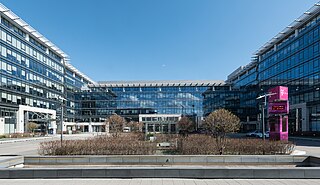Telecommunications in Burkina Faso include radio, television, fixed and mobile telephones, and the Internet.
Telecommunications in Georgia include radio, television, fixed and mobile telephones, and the Internet.

Telecommunications infrastructure in South Africa provides modern and efficient service to urban areas, including cellular and internet services. The Independent Communications Authority of South Africa (ICASA) is the watchdog of the telecommunications in the country.
The Universal Mobile Telecommunications System (UMTS) is a 3G mobile cellular system for networks based on the GSM standard. Developed and maintained by the 3GPP, UMTS is a component of the International Telecommunication Union IMT-2000 standard set and compares with the CDMA2000 standard set for networks based on the competing cdmaOne technology. UMTS uses wideband code-division multiple access (W-CDMA) radio access technology to offer greater spectral efficiency and bandwidth to mobile network operators.
Telkom SA SOC Limited is a South African wireline and wireless telecommunications provider, operating in more than 38 countries across the African continent. Telkom is majority state-owned (55.3%) with the South African government owning 40.5% of Telkom, while another 14.8% is owned by another state-owned company - the Public Investment Corporation (PIC), which is closely linked to the South African government.

A mobile phone feature is a capability, service, or application that a mobile phone offers to its users. Mobile phones are often referred to as feature phones, and offer basic telephony. Handsets with more advanced computing ability through the use of native code try to differentiate their own products by implementing additional functions to make them more attractive to consumers. This has led to great innovation in mobile phone development over the past 20 years.
Mobile marketing is a multi-channel online marketing technique focused at reaching a specific audience on their smartphones, feature phones, tablets, or any other related devices through websites, e-mail, SMS and MMS, social media, or mobile applications. Mobile marketing can provide customers with time and location sensitive, personalized information that promotes goods, services, appointment reminders and ideas. In a more theoretical manner, academic Andreas Kaplan defines mobile marketing as "any marketing activity conducted through a ubiquitous network to which consumers are constantly connected using a personal mobile device".

Wi-Fi calling, also called VoWiFi, refers to mobile phone voice calls and data that are made over IP networks using Wi-Fi, instead of the cell towers provided by cellular networks. Using this feature, compatible handsets are able to route regular cellular calls through a wireless LAN (Wi-Fi) network with broadband Internet, while seamlessly change connections between the two where necessary. This feature makes use of the Generic Access Network (GAN) protocol, also known as Unlicensed Mobile Access (UMA).
Safaricom PLC is a listed Kenyan mobile network operator headquartered at Safaricom House in Nairobi, Kenya. It is the largest telecommunications provider in Kenya, and one of the most profitable companies in the East and Central Africa region. The company offers mobile telephony, mobile money transfer, consumer electronics, ecommerce, cloud computing, data, music streaming, and fibre optic services. It is most renowned as the home of M-PESA, a mobile banking SMS-based service.

Sri Lanka Telecom PLC, doing business as SLT-MOBITEL, is the national telecommunications services provider in Sri Lanka and one of the country's largest companies with an annual turnover in excess of Rs 40 billion. The company provides domestic and corporate services which include fixed and wireless telephony, Internet access and IT services to domestic, public and business sector customers. As of 2018 SLT-MOBITEL was Sri Lanka's second largest mobile network operator with over 7.9 million subscribers.
Moldcell is a Moldovan mobile network operator and is a subsidiary of Nepalese company CG Corp Global. It works in GSM, UMTS and LTE standards.
Vodacom Tanzania Limited is Tanzania's leading cellular network company. As of December 2020, Vodacom Tanzania had over 15.6 million customers and was the largest wireless telecommunications network in Tanzania. Vodacom Tanzania is the second telecom company in Africa, after Vodacom, to switch on its 3G High-Speed Downlink Packet Access (HSDPA) which was available only in Dar Es Salaam in early 2007.

Airtel Tanzania Limited is the third-largest mobile network operator in Tanzania operated by Airtel Africa, which is a subsidiary of Bharti Airtel of India, behind Vodacom Tanzania and Tigo Tanzania. As of September 2017, Airtel Tanzania had 10.6 million voice subscribers. As of December 2017 according to data provided by the Tanzania Communications Regulatory Authority, Airtel Tanzania controlled 27.1 percent of Tanzania's mobile telephone market by customer numbers, at that time estimated at 10.86 million.

Emtel Ltd. is a telecommunications company based in Ebene City, Mauritius. Launched on 29 May 1989 – Emtel Ltd became the first mobile telephony operator in the Southern Hemisphere. This took place under the aegis of The Currimjee Jeewanjee Group.

A mobile phone or cell phone is a portable telephone that can make and receive calls over a radio frequency link while the user is moving within a telephone service area, as opposed to a fixed-location phone. The radio frequency link establishes a connection to the switching systems of a mobile phone operator, which provides access to the public switched telephone network (PSTN). Modern mobile telephone services use a cellular network architecture, and therefore mobile telephones are called cellphones in North America. In addition to telephony, digital mobile phones support a variety of other services, such as text messaging, multimedia messaging, email, Internet access, short-range wireless communications, satellite access, business applications, payments, multimedia playback and streaming, digital photography, and video games. Mobile phones offering only basic capabilities are known as feature phones ; mobile phones that offer greatly advanced computing capabilities are referred to as smartphones.

MagtiCom, LLC. is a Georgian telecoms company founded on February 12, 1996 by Dr. George (Gia) Jokhtaberidze. On September 22, 1997, the Company made the first commercial call from its mobile network. The services offered by MagtiCom involve as follows: mobile telephony; mobile internet - embracing different technologies of mobile network development, such as: 2G, 2.5G, 3G, 3.5G, 4G, 4.5G and 5G; Cable fixed telephony (VoIP); internet television (IPTV) and fiber-optic internet. Since 2016 MagtiCom started to provide IPTV, VoIP and fiber-optic internet.

T-Mobile Polska S.A. is a Polish mobile phone network operator. The company was formerly named Polska Telefonia Cyfrowa and operated under the name Era, until being rebranded as T-Mobile on 5 June 2011. As in other European countries, the company operates a GSM network. Following a decade-long ownership dispute with the French Vivendi corporation, the company has been wholly owned by the German telecommunications provider Deutsche Telekom since 2010.
Mobiles for development (M4D), a more specific iteration of Information and Communication Technologies for Development (ICT4D), refers to the use of mobile technologies in global development strategies. Focusing on the fields of international and socioeconomic development and human rights, M4D relies on the theory that increased access to mobile devices acts as an integral cornerstone in the promotion of overall societal development.

Telecom Italia Mobile S.p.A., commonly known as TIM, is an Italian telecommunications company owned by the TIM Group. Founded as a mobile telephony company in 1995, since 2015 it provides mobile, fixed telephony, and Internet services.













